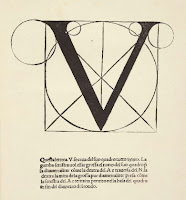 |
| The Duchy of Urbino. |
Although he is
considered the father of modern accounting, Pacioli never intended to be. Rather
he was trying to write a math textbook for his students. At the time Pacioli
was the tutor to sons of rich merchants.. Every time he had to design a new
lesson or look up a trigonomic relation, he had to travel back to the library
of the Duke of Urbino--a weeks travel.
.jpeg) |
| Pacioli, teaching math. Geometry, based on what he is drawing, and he reading out of Euclid while the Duke of Urbino watches creepily from behind. |
So he decided to
write a math textbook. Now, why I call it a textbook is that it was different than
most of the academic works of its time. It was written in Latin AND Italian.
The language choice is what differentiates this work from other academic
writings. Most scholars wrote in only Latin because they were writing for other
scholars. Pacioli chose to write in mainly Italian because this book was for
the masses not for the elite few cloistered in universities and libraries.
WARNING: Below Sean postulates on Pacioli's motives without academic/peer reviewed sources
Now why was
accounting put in a math textbook? I have two reasons: one historical and
boring, and the second is pure conjecture (and much more fun).
Reason 1: The Business major hadn't
been invented yet. All studies were traditionally in latin and universities more focused on studies of
divinity and science. Schooling was a luxury. Most students were nobility or
preparing for a life of the cloth. Applied mathematics, such as accounting,
where most commonly taught in apprenticeships.
Reason 2: His benefactors encouraged
him to include it. Again let me remind you this is conjecture. Remember
Pacioli is tutor to sons of wealthy
merchants. They are ensuring this friar lives quite comfortably (as evident by
his personal accounts he uses as an example in teaching inventories). If they
asked him to include a section on the skills needed for their sons to follow
them into mercantilism, how could Pacioli refuse.
Pacioli on Accounting
The section on accounting is rather small. Frankly tacked on at the end of the book. It is a relatively short introduction to the subject. Although it contains 36 chapters, it really only amounts to about 50 pages. He starts simply enough explaining how so set up your books then teaches basic journal entries, and works his way toward a trial balance. Yet, through all of that, he is able to fit in a chapter where he does nothing but give advice--on more than just accounting, on life in general.
I will write more about this in the future. Give quick mini-lessons on Pacioli's technique and compare it to what is taught in this modern era. It is rather amazing how many of his techniques are still in use to this day.
 |
| While not the Vitruvian Man, Leonardo Da Vinci taught perfect penmanship in Pacioli's work "De divina proportione" |
So there it is. The
story of Pacioli's writings on accounting. This however is not the totality of
his life. Pacioli went on to write many more books. One of his other works was referenced in the pop culture sensation writings of Dan Brown. He went on to befriend and
work with Leonardo DaVinci They traveled together and worked on two books
together. It is an amazing thing, when one of the greatest minds of the Renaissance is willing to illustrate the writings of this forgotten Friar. If time permits me I hope to talk more about the writings of Pacioli
and his life after "De Scripturis"

No comments:
Post a Comment